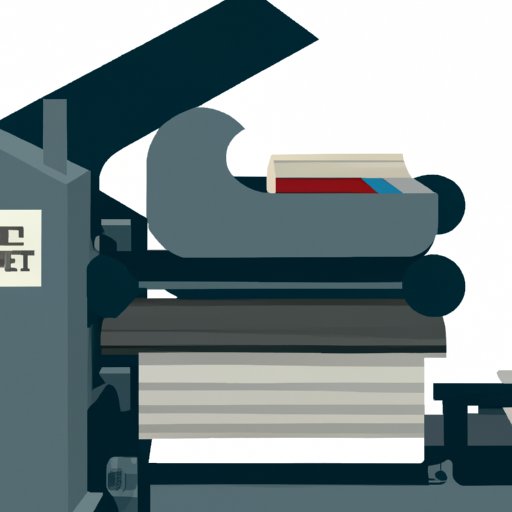Introduction
The invention of the printing press is one of the most important events in human history. It was a revolutionary invention that changed the way people communicated, shared knowledge, and interacted with each other. This article will explore why the invention of the printing press was so important and how it impacted society in various ways.

Impact of the Printing Press on the Spread of Knowledge and Education
The invention of the printing press allowed for the easier and faster spread of knowledge and education. Before the printing press, books were written by hand and could only be copied through laborious processes. With the invention of the printing press, books could now be printed in large numbers and distributed more easily. This made knowledge and education more accessible to larger populations.
The expansion of literacy was also a major impact of the printing press. According to a study by the National Endowment for the Humanities, “By 1500 the number of literate Europeans had grown from about 10 million to over 30 million.” This number continued to grow as the printing press made it possible for more people to access books and other sources of knowledge. The ability to print multiple copies of books also meant that these sources of knowledge could be shared with a wider audience.
Revolutionized Communication and Literature
The invention of the printing press revolutionized communication and literature. It reduced the barriers to communication by making it easier to share ideas and opinions. Books became more widely available, allowing people to access a greater variety of literature than ever before. This popularization of books led to an increase in reading, writing, and critical thinking skills.
The printing press also enabled authors to publish their work more easily, leading to a surge in creativity and the emergence of new genres of literature. This changed the way people wrote and thought about literature, and it laid the foundation for modern publishing and the literary canon.

Political Implications of the Printing Press
The invention of the printing press had significant political implications. It increased political awareness and discourse by making it easier to disseminate information and opinions. This led to the development of new political ideologies and movements, such as the Enlightenment and the Reformation.
The printing press also had an impact on religious thought and practice. It allowed for the dissemination of new religious ideas and the spread of religious texts, which challenged traditional beliefs and practices. This contributed to the rise of religious pluralism and tolerance in Europe.
Finally, the printing press promoted freedom of expression by making it easier to publish dissenting views. This allowed people to express their opinions without fear of persecution or censorship, which laid the groundwork for modern democracy.
Changed Way Information Was Disseminated
The invention of the printing press changed the way information was disseminated. It led to the creation of newspapers and other publications, which provided up-to-date news and information to readers. This allowed people to stay informed about current events and to form their own opinions on matters of public concern.
The printing press also led to the development of standardized forms of communication, such as books and newspapers. This made it easier to share knowledge and opinions across different cultures and languages. Finally, the printing press gave rise to mass media, which allowed people to access a vast array of information and entertainment.

Economic Benefits of the Printing Press
The invention of the printing press had significant economic benefits. It expanded markets for goods and services by making it easier to advertise and promote products. This increased competition and lowered prices, resulting in cheaper products for consumers.
The cost of production was also reduced, making it more affordable for businesses to produce books and other printed materials. This helped to drive down the cost of books and other printed materials, making them more accessible to the general public.
Finally, the printing press created employment opportunities for printers, booksellers, publishers, and other related professions. This allowed people to make a living by selling or producing books, which increased their economic security.
Conclusion
The invention of the printing press was an incredibly important event in human history. It revolutionized communication and literature, increased access to knowledge and education, and had significant political and economic implications. It changed the way information was disseminated and opened up new markets for goods and services. In short, the invention of the printing press was a game-changer and its impact is still felt today.
(Note: Is this article not meeting your expectations? Do you have knowledge or insights to share? Unlock new opportunities and expand your reach by joining our authors team. Click Registration to join us and share your expertise with our readers.)
